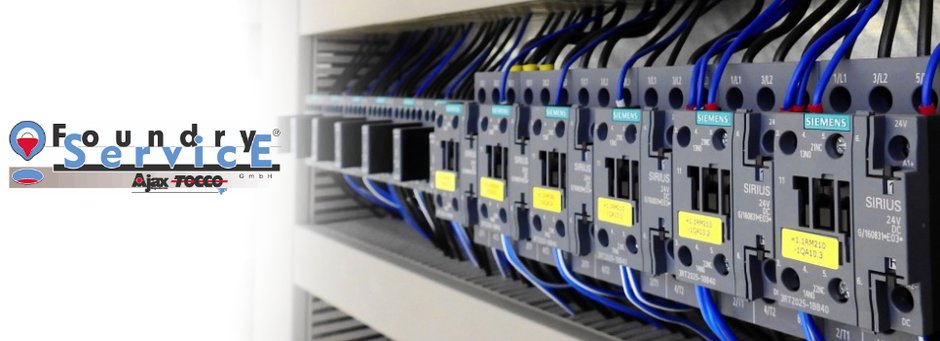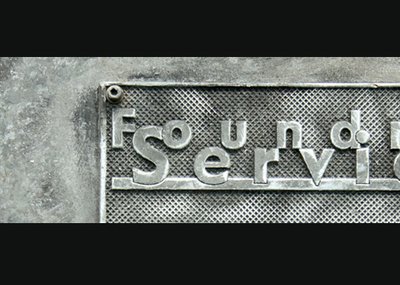With regular maintenance, production facilities in foundries reach an average service life of 30 to 40 years.
During this period, several generation changes have been made in the field of control and power technology, such as the use of PLC process control technology and converter technology.
In times of increasing price pressure on foundries, it is important to exploit all potential for cost savings. As part of the modernization of switchgears, a large number of improvements can therefore be incorporated into the respective smelting operation beyond the previous scope of control, which can considerably increase the effectiveness and thus the productivity of the foundry.
Due to the great diversity and the extremely different requirements in individual foundries, a large number of improvements and expansions can be made within the framework of modernization. The company Foundry Service GmbH presents its ideas below.
Update of the existing controls by Foundry Service GmbH
Production plants that have been in operation for more than 30 years have a considerable number of mechanical control devices and/or contact-based control technology.
Spare parts, replacement devices or documentations for these switchgears can hardly or no longer be procured, so that failures of these devices inevitably lead to ever longer downtimes of production facilities.
The great diversity of switchboards and the lack of harmonization require an extensive and sophisticated spare parts stocking of complex and possibly complicated special components.
In addition, the maintenance staff must be familiar with the handling of these components.
By using standard components such as modern PLC assemblies, switchgear and transmitters, productivity will be ensured in the future, too, and spare parts stocks will be reduced to a minimum.
An additional training of the maintenance staff is not necessary, due to the high interchangeability of the standard components.
The Foundry Service spectrum for the modernization of control systems includes all existing production facilities in foundries, such as:
- LF/MF induction systems
- Heat treatment plants
- Molding plants
- Mold transport systems
- Sand preparation systems
- Ladle transport systems
- Cooling water and filter systems
- Transport and dosing systems
- Production data recording systems
- Energy management systems
The modernizations of the production plants are carried out by Foundry Service GmbH in a completely customer-oriented way and with absolute adherence to delivery dates.
A Foundry Service GmbH modernization is structured as follows:
- Project planning of the switchgear
- CAD design of electrical circuit diagrams
- Software development
- Dismantling of the old system
- Assembly of the new system
- Start-up and training
Below, various functions of process control technology that is used particularly for foundry operation are explained in more detail.
Process control system:
Foundry Service "Project 1": MeltingProcessor
The MeltingProcessor is a system consisting of hardware and software for controlling induction melting furnaces, which is suitable for retrofitting into existing furnace systems, offering the following advantages over manual furnace operation:
- Reduction of the energy demand
- Increase of productivity by reducing non-productive time
- Reproducible quality of the melt
- Relief for the operating staff
- Increased operational reliability
- Increased safety against overheating of the refractory lining
- Special protection of the refractory lining e.g. through weight-dependent control of the power supply
- Documentation of operating data (ISO 9000ff)
The following operating modes can be realized with the melting processor:
- Smelting
- Overheating
- Holding
- Cold start
- Sintering
In addition to the operating modes described above, the system also offers the following functions:
- Logging of error messages
- Batch and shift logs
- Charge computation
- Analysis correction
Hardware structure of a MeltingProcessor
Foundry Service "Project 2": ChargingSystem
The heart of the charging system is a computer, which is located e.g. in the control station and which carries out a constant data exchange with a possibly existing MeltingProcessor, the spectrometer, a central server in the company network, the crane scale as well as one text display and one platform scale each for the addition of aggregates and alloys.
The recipes for the materials to be produced are created on the charging computer and a sequence of recipes for a daily production is compiled. If desired, the recipe creation can also be carried out cost-optimized by the computer. The master data for the indicative analyses as well as the input materials and aggregates are the basis for recipe creation. Alternatively, the associated data (e.g. the percentage shares of the individual alloying elements) can be entered and managed on the computer itself or transferred from the server in the company network from any database system (SQL server, Oracle, etc.).
Foundry Service GmbH "Project 3": Program for the creation of factory test certificates according to EN 10204
The program, which runs under Windows 98, 2000, NT and XP, is used for the convenient creation of factory test certificates according to EN 10204. The program automatically takes over the information required for creation, such as analysis data, mechanical properties, etc. from database files, into which the appropriate data are entered that are derived from other programs, such as MeltingPprocessor, charging system, evaluation program for tensile specimens, etc. These files may be located on any computer within the company network.
Foundry Service GmbH "Project 4": Program for the evaluation of tensile specimens
The program for evaluating tensile specimens, which runs under Windows 98, 2000, NT and XP, takes over the information on the force-extension diagrams stored in ASCII files by a tensile testing machine (e.g. Wolpert), displays it graphically, determines the yield strength Rp0.2 in particular, stores all data in a database system and also provides a possibility for statistical evaluation of the specimens.
The program displays the imported data in the form of a stress-strain diagram. The order and physical-sample data as well as the inspection results are listed in the tables on the right-hand side of the screen.
The program also offers the following functions:
- Determination of the yield strength Rp0.2
- Transfer of the data to a database system
- Statistical evaluation



